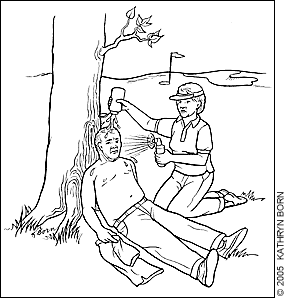
Am Fam Physician. 2005;71(11):2141-2142
See related article on heatstroke and heat exhaustion
What is heat exhaustion?
Heat exhaustion happens when your body gets too hot. It can be caused by exercise or hot weather. You may feel weak, dizzy, or worried. You also may have a headache or a fast heartbeat. You may get dehydrated and have very little urine.
What should I do if I think I have heat exhaustion?
If you think you may have heat exhaustion, get out of the heat quickly. Rest in a cool, shady place and drink plenty of water or other fluids. Do NOT drink alcohol. Alcohol can make heat exhaustion worse. If you do not feel better within 30 minutes, you should see your doctor. If heat exhaustion is not treated, you can get heatstroke.
What is heatstroke?
Heatstroke is much more serious than heat exhaustion and can kill you. People with heatstroke may seem confused. They may have seizures or go into a coma. Most people with heatstroke also have a fever. Heatstroke can happen when your body gets too hot, or it can happen after heat exhaustion.
What should I do if I think someone has heatstroke?
If you think someone might have heatstroke, you should take him or her to a cool, shady place quickly, and call a doctor. Removing the person’s unnecessary clothing and bathing or spraying the person’s skin with cool water can help cool him or her down. Try to fan warm air over the person while wetting the skin with lukewarm water. The evaporation of the water will speed cooling (see the figure below).

How can I keep from getting heat exhaustion and heatstroke?
Do not exercise outside when it is hot and humid. If you have traveled to a place that is hotter than where you live, do not exercise for at least a week. In hot weather, wear cool, light clothing and drink plenty of nonalcoholic fluids. If a heat wave happens, stay in an air-conditioned place. Get medical help immediately if you think you might have heat exhaustion or heatstroke.
How do medicines affect heatstroke?
Some medicines can put you in danger of heatstroke. Tell your doctor what medications you are taking. Some medicines that may affect heatstroke are:
Allergy medicines (antihistamines)
Cough and cold medicines (anticholinergics)
Blood pressure and heart medicines
Alpha andrenergics such as midodrine (one brand: ProAmatine) or pseudoephedrine (one brand: Sudafed)
Beta blockers
Calcium channel blockers
Diet pills (amphetamines)
Irritable bladder and irritable bowel medicines (anticholinergics)
Laxatives
Mental health medicines
Benzodiazepines such as clonazepam (one brand: Klonopin), diazepam (one brand: Valium), chlordiazepoxide (one brand: Librium)
Neuroleptics
Tricyclic antidepressants
Seizure medicines (anticonvulsants)
Thyroid pills
Water pills
Your doctor can tell you if your medicine puts you in danger of heatstroke.
What should I do after having heat exhaustion or heatstroke?
Having heat exhaustion or heatstroke makes you more vulnerable to hot conditions for about a week afterwards. Be especially careful not to exercise too hard, and avoid hot weather. Ask your doctor to tell you when it is safe to return to your normal activities.